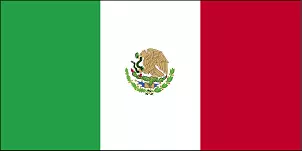The Spanish took most of modern day Mexico with ease due to advanced weapons and confusion among the local people, some of whom viewed the Spanish as gods. The Spanish quickly subjugated the local people as their earlier remnants of a social hierarchy allowed the Spanish to place the local people below themselves with relative ease.
Despite various social levels, the Spanish and local people intermarried and soon the country was controlled by the upper class, which consisted of those who were primarily Spanish. This led to great controversy, arguments, and political chaos for hundreds of years despite Mexican independence from Spain in the early 1800s.
Sadly Mexico established a pattern of political instability early in its history and this instability has led to a lack of trust in politics. Starting a business was confined to those who had political connections and people feared the government instead of viewing it as a medium for change. As many countries focused on economic growth and power, the people of Mexico focused on maintaining survival from harsh rulers as the people placed their trust in the hands of the Catholic Church. As many countries experienced technological and economic progress they turned to the government to make changes to achieve these goals. In Mexico, the people clung to religion as they feared the government and avoided the dangerous implications of getting involved politically and in many cases economically.
Although the political situation in Mexico has greatly settled down, the people still turn to religion and their neighbors as the most trustworthy institutions. Also, due to political instability in the past and a lack of technology in the present, farming remains the primary and most important industry as a huge number of people partake in this industry to make a living. Despite this, another huge change in the culture of the Mexican people came more recently as foreign countries invest in Mexico, most notably the United States. This investment has led to cities in Mexico quickly growing as factories arise and provide a new means to make a living, and more importantly a new way of life as rural people are migrating to the cities to find better paying jobs.
Today the people of Mexico continue to distrust the government as many farmers struggle to make ends meet. This has led to a massive urban migration in recent decades and a severe case of emigration, primarily to the United States, as these people seek a better future for themselves or their children. The people are well aware of the technology and opportunities that surround them but are frustrated with corruption and crime which prevent them from obtaining many of these items. This means the people continue to rely on the church, family, and friends for support as Mexican culture today continues to be strongly tied to the church and family, while sports, most particularly soccer, and food contribute greatly to making their time with friends and family more enjoyable.
 Mexico's flag stands on a green, white, and red background; colors that represent hope, joy, and love for green, peace and honesty for white, and hardiness, bravery, strength, and valor for red. In the center of the flag is the country's coat of arms. The coat of arms is based on an Aztec legend that stated they should settle in a location where they see an eagle on a cactus eating a snake; after supposedly seeing this scene, they built the city of Tenochtitlan, which is now Mexico City.
Mexico's flag stands on a green, white, and red background; colors that represent hope, joy, and love for green, peace and honesty for white, and hardiness, bravery, strength, and valor for red. In the center of the flag is the country's coat of arms. The coat of arms is based on an Aztec legend that stated they should settle in a location where they see an eagle on a cactus eating a snake; after supposedly seeing this scene, they built the city of Tenochtitlan, which is now Mexico City.
Name: United Mexican States
Independence: September 16, 1810; recognized September 27, 1821
Capital: Mexico City
Currency: Mexican Peso
Population: 116,220,947 (2013 estimate)
Ethnicity: Mestizo, Amerindian, & European
Language: Spanish
Religion: Roman Catholic